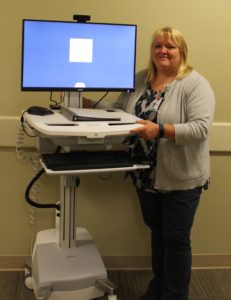New partnership with Genesis adds easier access to mental health counseling
~by Victoria Riley, GreeneCountyNewsOnline
Greene County residents who struggle with mental illness are not the only ones who scored a win when TelePsych was introduced last May at Greene County Medical Center and at the Law Enforcement Center. All county taxpayers also scored a win, as the new system saves money in serving those in a mental health crisis and jail inmates with psychiatric needs.

Making the win even bigger is that cost to implement the system was minimal – a laptop computer, microphone, speakers, and a cart to hold them in each location. The Heart of Iowa Community Services mental health region (Greene, Audubon, Guthrie and Dallas counties), which is state-funded, pays the majority of the expense.
TelePsych is used to get appropriate psychiatric care for patients at the medical center’s emergency room. Sheriff Jack Williams estimates that his office responds to five calls a week about suicidal persons. Many of them end up at the ER. Others are taken there by relatives or friends.
The ER doctors are not mental health specialists, but using TelePsych, which is similar to Skype or Facetime, patients are “seen” by a fully-licensed mental health provider while they’re at the ER, usually within an hour.
The results are encouraging. According to chief nursing executive Katie Heldt, RN, of 22 patients seen in the ER since late May, 10 were referred to inpatient treatment. That number is lower than in the past.
“ER doctors aren’t experts in mental health, so they more often erred on the side of caution. They didn’t send people back home if they weren’t absolutely sure they’d be safe,” Heldt explained.
Integrated Telehealth Partners is the company behind TelePsych. ITP-employed specialists are available 24/7.
The TelePsych specialist can determine if a patient needs only a medication adjustment and outpatient therapy. Those patients go home.
Partnership with Genesis: Additionally, the ease of getting outpatient treatment increased earlier this month through a new partnership between the medical center and Genesis Development. Genesis Development relocated one of its licensed therapists to an office at the medical center. The therapist is there every Monday.
According to Heldt, it makes referrals from the ER easier, as medical center staff is able to schedule appointments. Patients leave with an appointment set, rather than being given only a list of providers. Patients sometimes had to wait as long as six weeks to be seen.
Terry Johnson, chief executive officer of Genesis, agrees. “The partnership expedites the process, makes it simpler for people,” he said. “Of course they can go somewhere else, but this gives them a direct connection.”
“What we’re doing gives people the support they need right here in our community, and it saves taxpayers money by keeping them out of hospitals,” Johnson said. Most insurance policies cover mental health costs, but for those who are uninsured or on Medicaid, it’s the taxpayers who end up footing the bill.
Another bonus of TelePsych is that if a patient is referred for inpatient treatment, staff at Integrated Telehealth Partners locates the appropriate facility. That takes between three and four hours, but in the past, the wait time was often much longer and it was medical center staff time being used.
In the case of a patient who is committed by the court, a sheriff’s deputy waits at the ER until committal papers are signed and a transport to an inpatient facility is arranged. A deputy then does the transport. According to Williams, deputies spent four days at ER once waiting for a facility to be located.
Heldt said that of those who are sent for inpatient treatment, the number of voluntary committals has increased and the number of court ordered committals has decreased. “After people talk with the TelePsych person they feel more comfortable and more confident that the plan is right. They’re more likely to agree to it on their own,” she said.
Parents are able to talk with the TelePsych provider in the case of minor patients, and that also increases their comfort level.
TelePsych at the county jail is an obvious plus. Williams says up to 90 percent of the inmates have mental health issues. Before implementing TelePsych, inmates who needed psychotropic medications were taken by a deputy to see a local provider. “There’s always the security issue,” Williams said.
Jail administrator Karen White appreciates that the specialists who see jail inmates know their needs. Inmates fill out a questionnaire before being seen, and that information is sent along to the specialist. Up to an hour is allowed for the TelePsych appointment. “I think the inmates’ needs are better met, and they feel like they’re getting better service because they have someone qualified listening to them.”
The need for better services for mental health patients at the ER is common in rural hospitals. Ann Erickson, RN, medical center director of nursing, and Carl Behne, chief executive officer, were part of a working group last March gathered by Chuck Palmer, who was then director of the Iowa Department of Human Services. Erickson and Behne represented critical access hospitals without psychiatric services.
The group was to discuss a state-wide tracking system for psychiatric beds, and to discuss the current law that only a medical doctor can send a patient for inpatient services.
Out of that meeting came more awareness of the Heart of Iowa region’s role in administering state mental health funds.
A Greene County mental health coalition has now been established that includes Ellen Ritter of the Heart of Iowa, medical center staff, the Jefferson police department and the sheriff’s office, the magistrate, public health, UnityPoint Clinic, school counselors and nurses, and staff from the Hope Wellness Center in Woodward.
The coalition meets bi-monthly. “We want to be sure we’re all working on the same page. We’re talking about what works well and what doesn’t work,” Erickson said. “There’s still a lot of work left to do.”
